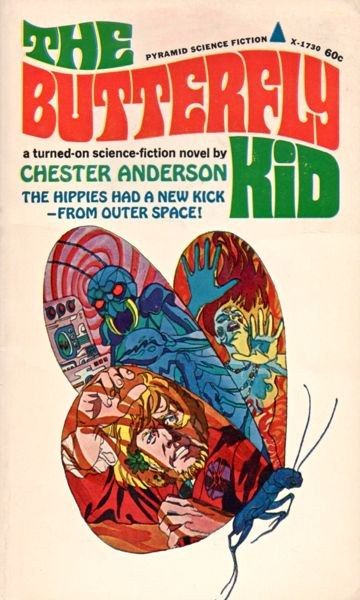Lost Voices 21: The Butterfly Kid by Chester Anderson
The Butterfly Kid
By Chester Anderson

8 May, 2000
0 comments
The Butterfly Kid
Chester Anderson
Pocket Books [1967]
204 pages
Synopsis: On his way through a Greenwich Village twenty years into the 1960s, Chester Anderson encounters Sean, a kid from Texas. What makes Sean stand out is his ability to create butterflies out of nothing, in any form he desires. Sean is not alone: other people also demonstrate their ability to make real hallucinations. Eventually, Chester, Michael Kurland and their motley crew of singers, poets, pot heads and general Greenwich Village riffraff track the source of the pills down: Laszlo Scott, the lowest of the low, the sort of person who sells teenagers oregano and deliberately spreads social diseases.
Suspecting that Laszlo’s motives for giving away the Reality Pill [as the hallucinogen is called] may well be impure, Chester and Michael investigate Laszlo. Chester eventually manages to discover that Laszlo is working with giant blue lobsters. Managing to get caught, Chester discovers the evil plans of the alien Kkkkk: by spreading the Reality Pill through the water supply, they hope to empower humans to the point where their fantasies made real will exterminate us. This will avoid the Kkkkk taboo against violence, since they will not be the ones creating the hallucinations. Fortunately for Chester, the Kkkkk have certain unexpected weaknesses to human rock music and he able to interrogate them during a torture scene which recalls a scene from a Retief story. Eventually escaping, he and his friends jump in their hoverbus, enjoying diverse adventures before getting to the New York Reservoir where the Kkkkk plan to dump 10 billion doses of the RP, to test on a major city before moving on to dosing the planet.
The crew arrives at the reservoir. Realising they are woefully underarmed, they all wolf down mouthfuls of the Reality Pills, Chester having thoughtfully stolen a briefcase full. The battle scene which follows is difficult to describe, the high points being perhaps the nuclear weapon used at arms-reach at one point and the many battalions of BOLO-class war automatons Chester keeps sending out, being too drug addled. The hippies survive the waves of unreal beings the Kkkkk send at them, losing one person, Little Mikey, to a pretty horrible death by child-monster. They go on the offensive, only to find that Armoured details Toggle-Xylophone and Marshmallow-Buggywhip have already engaged the enemy and defeated them. The aliens are banished and fined all of their recent colony worlds for their attempted invasion. Laszlo is banished with them. Life then returns to abnormal in Greenwich Village, although it appears it may be a long, long time before the effects of the Reality Pills wear off.
This is very much a period piece, which really couldn’t have been written much earlier or later than it was, between, oh, 1965 and 1968. It’s allegedly set in the future of 1967, but in this world there were never riots in Chicago or deaths at Altamont. Herpes Simplex II and HIV never interfered with the sexual revolution1.
Despite the death of Little Mikey, this is a good natured, gentle little freak fantasy. Of course, it is not without date-related weaknesses: the portrayal of women is very post-sexual revolution/pre-women’s lib and I expect if Anderson were alive to describe a black cop, he might neglect to use the word ‘spade’. As well, the use of looks as a convenient character marker grates. None of this, however, is meant maliciously.
The Butterfly Kid is one of three related novels by Anderson, Michael Kurland and T.A. Waters. Kurland’s The Unicorn Girl is about as good as TBK. I found T.A. Waters’ The Probability Pad disappointing. Chester Anderson co-wrote Ten Years to Doomsday with Kurland. He wrote Fox and Hare , an apparently semi-autobiographical work which just went on my find-now, maim-to-get list and much poetry. He died in 1991.
